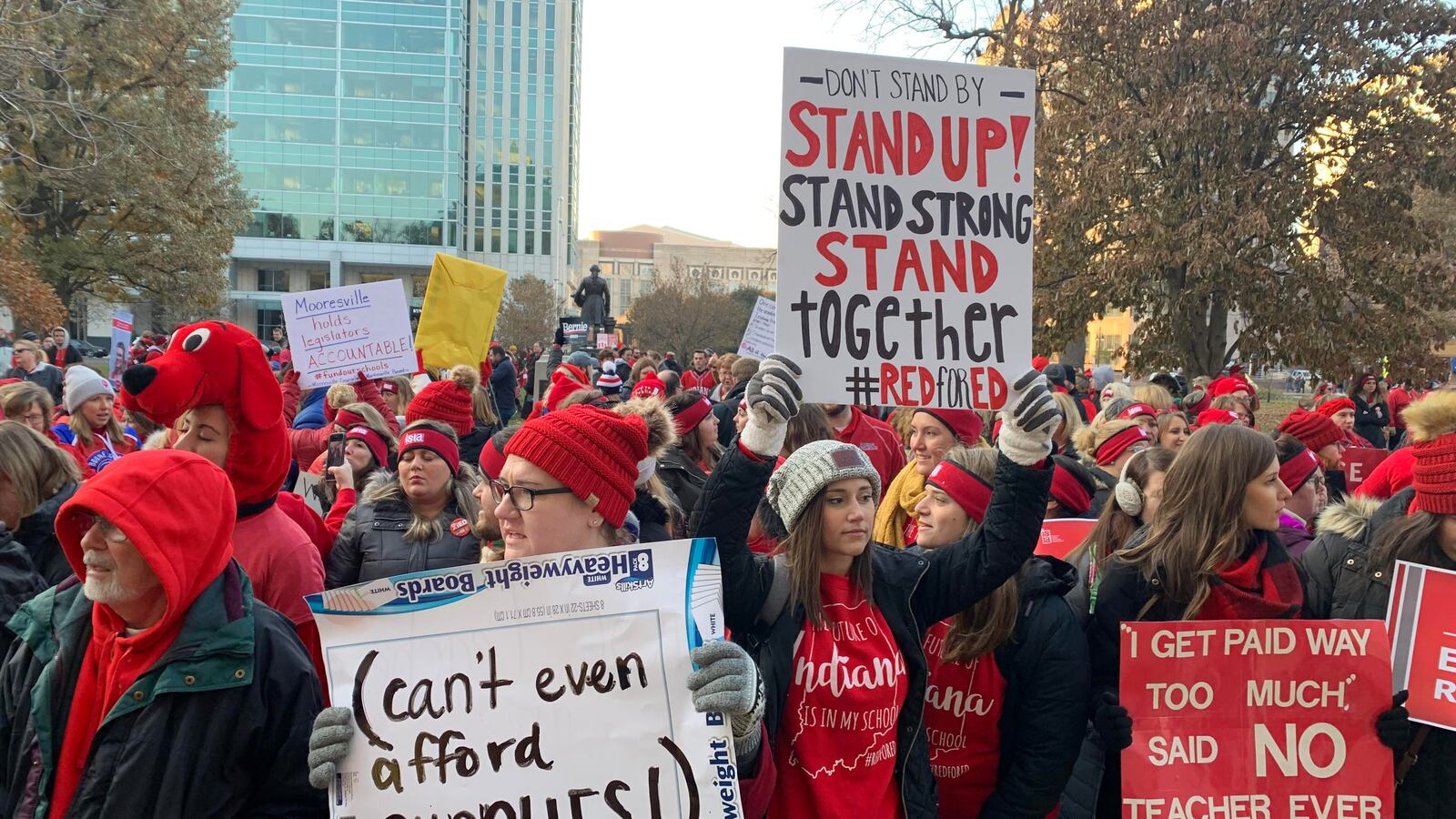Tuesday’s Red For Ed rally at the Indiana Statehouse saw thousands of teachers attend, but what happens next?
The one-day demonstration ended without any promises from lawmakers, but the state’s top Republican legislator suggested the massive gathering could lead to changes down the road.
“We get it,” said House Speaker Brian Bosma, addressing teachers from the House chamber. “We get that you’re frustrated. We get that you are concerned.”
The rally marked the state’s first large-scale demonstration amid a wave of teacher activism nationwide. Indiana State Police said more than 5,000 people were inside the statehouse, not counting the number of people amassed outside. The Indiana State Teachers Association, the state’s largest union, estimated around 20,000 teachers attended, and said that 146 school districts across the state canceled classes.
The state teachers union is asking the General Assembly to do three things: allocate part of the state’s more than $2 billion surplus to schools, pass a hold-harmless provision to protect teachers and schools from any negative consequences related to low 2019 ILEARN test scores, and repeal new licensing requirements mandating teachers to do 15 hours of professional development related to their community’s workforce needs.
Read more: We asked Indiana teachers why they are rallying. Here’s what they said.
Teachers who were there also demanded higher pay, smaller class sizes, less standardized testing and more respect, among other things.
It remains to be seen how many of their asks will find support among the General Assembly’s Republican supermajority, especially when the state’s budget is already set through 2020. Here are five things to watch as the story unfolds:
1. Lawmakers will consider decoupling teacher evaluations from test scores.
Bosma said lawmakers need to take a “hard look” at separating teacher assessments from test scores. Currently, standardized test scores factor into teacher’s rating, which affects whether they are eligible for raises or bonuses.
Education advocates, including State Superintendent Jennifer McCormick, have called for decoupling the two for years, arguing that the standardized test in Indiana has become too high-stakes. But until now, the idea has not seen support from lawmakers, such as Bosma, who backed previous education reforms aimed at increasing accountability.
“Maybe that doesn’t make as much sense as it seemed to 20 years ago,” the House Speaker said during a legislative preview Indiana chamber hosted on Monday.
2. A hold-harmless provision is expected to pass quickly.
Passing a hold-harmless provision to protect teacher evaluations and school’s A-F grades from potential negative consequences of low ILEARN scores remains among lawmaker’s top priorities, Bosma said Tuesday. Calls for the one-year exemption started pouring in from schools and state leaders — including Gov. Eric Holcomb — even before the 2019 scores were publicly released. And districts were already given permission by the state to finish teacher evaluations with 2018 grades so they can get their bonuses on time.
The General Assembly is expected to formally pass hold-harmless legislation quickly after the session starts in January.
3. The budget may be opened, which would also create the opportunity for increasing education funding.
It’s not yet clear if lawmakers will need to open the budget this year. Bosma previously said he does not want to, but also that he is interested in using some of the state’s $2 billion surplus. Democrat lawmakers argue that would mean opening the budget — which could mean putting some of that money toward education.
The Indiana teachers union, ISTA, wants the state to give schools $75 million of the estimated $400 million the state will bring in this year above its expected revenue, President Keith Gambill has told Chalkbeat.
Republican lawmakers, however, don’t seem interested in using the surplus for education. Bosma and Rep. Bob Behning, chairman of the House Education Committee, have both said using a one-time influx of cash would be irresponsible because that revenue stream could not be sustained going forward. Bosma said he wants to use the surplus to pay down the state’s long-term debts.
4. Lawmakers may dial back on the list of required training for teachers, including 15-hour “externships.”
ISTA is asking lawmakers to repeal a new licensing requirement that has teachers doing unpaid “externships” in local businesses to get 15 hours of professional development related to their community’s workforce needs.
At a legislative preview on Monday, Bosma said he sees the value in the requirement for high school teachers, but questioned whether it was worthwhile for elementary school teachers — signaling his openness to changing it.
Bosma said Tuesday that the General Assembly should also revisit the long list of state-required trainings for teachers. Earlier this month a state committee charged the department of education with recommending how to consolidate or trim the list.
5. Indiana could see more action from teachers.
Multiple speakers at Tuesday’s rally called on teachers to continue the momentum.
“This is Day One of many days,” McCormick said when addressing teachers on Tuesday. “This can’t start and end today.”
Becky Pringle, vice president of the National Education Association, called on teachers to do “whatever it takes.” Meanwhile, Randi Weingarten, National President of the American Federation of Teachers, said Indiana’s teacher were experiencing the same anger she’s seen in other states where teachers went on strike for better funding or higher pay, such as West Virginia, Kentucky, and Oklahoma.
No one called for Indiana teachers to strike — Weingarten called that a “last resort” — but they did encourage them to meet with lawmakers, write letters, and turn out for the 2020 gubernatorial election.

